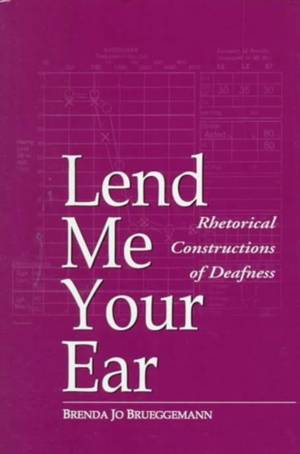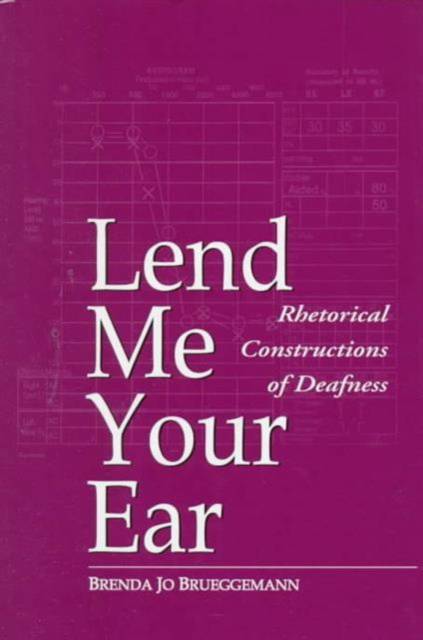
- Afhalen na 1 uur in een winkel met voorraad
- Gratis thuislevering in België vanaf € 30
- Ruim aanbod met 7 miljoen producten
- Afhalen na 1 uur in een winkel met voorraad
- Gratis thuislevering in België vanaf € 30
- Ruim aanbod met 7 miljoen producten
Zoeken
€ 72,95
+ 145 punten
Omschrijving
The tradition of rhetoric established 2,500 years ago emphasizes the imperative of speech as a defining characteristic of reason. But in her new book Lend Me Your Ear, Brenda Jo Brueggemann exposes this tradition's effect of disallowing deaf people human identity because of their natural silence. Brueggemann's assault upon this long-standing rhetorical conceit is both erudite and personal; she writes both as a scholar and as a hard-of-hearing woman. In this broadly based study, she presents a profound analysis and understanding of this rhetorical tradition's descendent disciplines (e.g., audiology, speech/language pathology) that continue to limit deaf people. Next to this even-handed scholarship, she juxtaposes a volatile emotional counterpoint achieved through interviews with Deaf individuals who have faced rhetorically constructed restrictions, and interludes of her own poetry and memoirs.
The energized structure of Lend Me Your Ear galvanizes new thought on the rhetoric surrounding Deaf people by posing basic questions from a rhetorical context: How is deafness constructed as a disability, pathology, or culture through the institutions of literacy education and science/technology, and how do these constructions fit with those of deaf people themselves? The rhetoric of deafness as pathology is associated with the conventional medical and scientific establishments, and literacy education fosters deafness as disability, both dependent upon the premise that speech drives communication. This kinetic study demands consideration of deafness in terms of the rhetoric of Deaf culture, American Sign Language (ASL), and the political activism of Deaf people. Brueggemann argues strenuously and successfully for a reevaluation of the speech model of rhetoric in light of the singular qualities of ASL poetry, a genre that adds the dimension of space and is not disembodied. Ironically, without a word being spoken or printed, ASL poetry returns to the fading, prized oral tradition of poets such as Homer. The speech imperative in traditional rhetoric also fails to present rhetorical forms for listening, or a rhetoric of silence. These and other break-out concepts introduced in Lend Me Your Ear that will stimulate scholars and students of rhetoric, language, and Deaf studies to return to this intriguing work again and again.
The energized structure of Lend Me Your Ear galvanizes new thought on the rhetoric surrounding Deaf people by posing basic questions from a rhetorical context: How is deafness constructed as a disability, pathology, or culture through the institutions of literacy education and science/technology, and how do these constructions fit with those of deaf people themselves? The rhetoric of deafness as pathology is associated with the conventional medical and scientific establishments, and literacy education fosters deafness as disability, both dependent upon the premise that speech drives communication. This kinetic study demands consideration of deafness in terms of the rhetoric of Deaf culture, American Sign Language (ASL), and the political activism of Deaf people. Brueggemann argues strenuously and successfully for a reevaluation of the speech model of rhetoric in light of the singular qualities of ASL poetry, a genre that adds the dimension of space and is not disembodied. Ironically, without a word being spoken or printed, ASL poetry returns to the fading, prized oral tradition of poets such as Homer. The speech imperative in traditional rhetoric also fails to present rhetorical forms for listening, or a rhetoric of silence. These and other break-out concepts introduced in Lend Me Your Ear that will stimulate scholars and students of rhetoric, language, and Deaf studies to return to this intriguing work again and again.
Specificaties
Betrokkenen
- Auteur(s):
- Uitgeverij:
Inhoud
- Aantal bladzijden:
- 302
- Taal:
- Engels
Eigenschappen
- Productcode (EAN):
- 9781563680793
- Verschijningsdatum:
- 2/06/1999
- Uitvoering:
- Hardcover
- Formaat:
- Genaaid
- Afmetingen:
- 161 mm x 237 mm
- Gewicht:
- 453 g

Alleen bij Standaard Boekhandel
+ 145 punten op je klantenkaart van Standaard Boekhandel
Beoordelingen
We publiceren alleen reviews die voldoen aan de voorwaarden voor reviews. Bekijk onze voorwaarden voor reviews.











